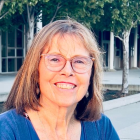Support strong Canadian climate journalism for 2025
These in-their-own-words pieces are told to Patricia Lane and co-edited with input from the interviewee for the purpose of brevity.
Fifteen-year-old Anna Brozek is teaching business leaders about sustainability. Starfish Canada named this Fall River, Nova Scotia student one of 2023’s Top 25 Environmentalists under 25 for her Planet in Mind website helping businesses and individuals reduce climate pollution, and for designing and co-hosting “Tech for Tomorrow,” a January 2024 evening of talks and networking opportunities bringing leading-edge thinkers together.
Tell us about your projects.
Planet in Mind provides a pathway to improve sustainability. It features interviews with business leaders to show others the way. It provides information for companies and individuals on the climate crisis and how to increase their agency step-by-step. Tech for Tomorrow featured opportunities for networking and seven speakers on a variety of topics, ranging from showcasing a local business working on ocean clean-up to a university professor talking about how she supports her students suffering from climate distress.
What role did you play in each of these endeavours?
I conceptualized them both. For Planet in Mind, I did all the research and interviews and designed and built the website. I also recruited the volunteers who work with me in Alberta and Ontario to add more information and respond to inquiries. For Tech for Tomorrow, I sought out COVE, a Dartmouth, N.S., ocean technology innovation hub, as my partner. They provided the facility and organizational credibility, and we worked together to identify speakers and design the program. I gave the keynote opening address.
What was hard about each of these?
I think, like many people, I get anxious and feel tempted to pull back when I’m trying new things. I was so nervous before my first interview for Planet in Mind that I had a nosebleed! Doing my first public speaking engagement was also nerve-wracking, and there was always the thought in the back of my mind that I could make an excuse to get out of it. But my parents raised me to believe I can do hard things and taught me about the privilege I have to be able to act, so I push through. It has always paid off!
How did you get into this kind of work?
I spent half of my childhood in Ontario. I was quiet and shy, but my parents made a big point of taking the family out into nature for hikes and walks as much as possible, which really helped. I could see and feel how much better I felt with time in the natural world. I notice since we moved here and live close to wilder spaces, I am much happier and calmer. Nature cares for me. I want to care for it.

How did the way you were raised help get you where you are now?
My parents are very supportive, and they have made a point of showing me I can feel scared, but I am mentally tough and can do the thing anyway. My mom and I watched a TED Talk together that discussed having a few seconds of courage to just start — start a conversation, a project. That really helped me get past my nervousness.
What keeps you awake at night?
The climate crisis is so urgent and so vast. I don't feel I have enough time to do everything I could to play my part in making the future better.
What gives you hope?
There are so many solutions if you know where to look. Thousands of passionate, intelligent people are working hard to save us.
I felt very inspired when I learned about the Montreal Protocol. The whole world came together to solve that problem. I hope we can do that again.
To keep climate pollution stabilized below 1.5 degrees, we will have to solve so many other issues too — strengthen international co-operation, innovation, and much more. The world will be much better overall.
How do you stay engaged?
I take time to enjoy school and hanging out with friends and family in ways that have nothing to do with climate change. I play alto and baritone saxophone at school. I love to paint and crochet. I enjoy video games. It’s important for me to have hobbies that foster my creativity and reduce the risk of burning out.
What advice would you give to other young people?
Be passionate and be balanced. We need the gifts and energy you have for climate work, and we also need you to be a whole person.
What about older readers?
Mentorship from older people has helped me so much. In my keynote address at the Tech for Tomorrow seminar, I talked about the importance of having adults, in addition to my family, who care about me, support my ideas and help me develop a pathway to make them happen. I get really emotional when I think about how grateful I am for this help. No matter what field you are in, from science to art to community-building, when you mentor young people in this way, you give a priceless gift.







Comments